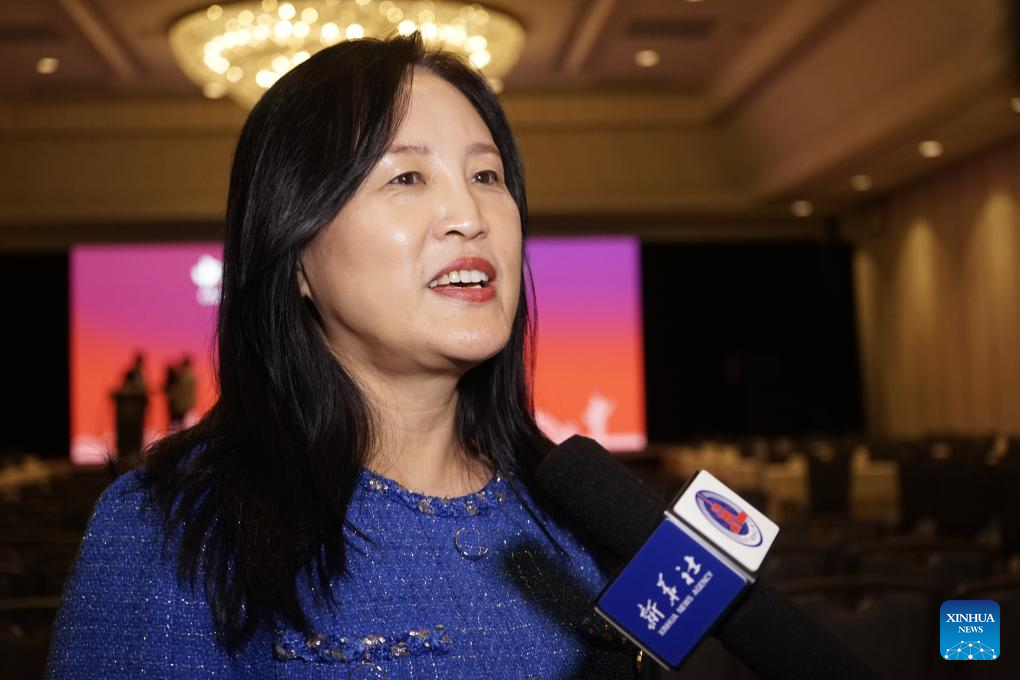"De-risking" against China raises prices, harms innovation in consumer electronics

Liu Chun, vice president of China Chamber of Commerce for Import and Export of Machinery and Electronic Products, speaks to Xinhua in an exclusive interview during the 2024 Consumer Electronics Show (CES) in Las Vegas, the United States, Jan. 9, 2024. (Photo by Zeng Hui/Xinhua)
LAS VEGAS, United States, Jan. 11 (Xinhua) -- The Consumer Electronics Show (CES), once a showcase of global tech innovation, is overshadowed by uncertainty produced by the so-called "de-risking."
For Zhong Xiaojun, general manager of Allpowers, a firm based in the southern Chinese city of Guangzhou and a Chinese exhibitor of green energy products at the 2024 show in Las Vegas held from Jan. 9 to 12, the supply chain web is tangled by tariffs and geopolitical tensions.
The difficulty stems from the United States and European politician's "de-risking" strategy aimed at reducing dependence on China in supply chains. But as Zhong and other business insiders have observed, the intended outcome isn't always the result.
Zhong's company has been designing and manufacturing solar products and batteries for 12 years in China. It has 60 overseas warehouses worldwide. Despite the U.S. tariffs and restrictions on certain products from China, there are ways to bypass them via warehouses in other countries, said Zhong.
Instead of building resilience as touted by politicians, "de-risking" might be lengthening and complicating the existing supply chains. He said a long supply chain means higher prices, and that the extra cost would be added to the prices for consumers in the U.S. market.
Research backs up these anecdotal experiences. A study by the Centre for Economic Policy Research, a European think tank, found that the United States' shift away from Chinese imports towards Vietnamese ones led to a nearly 10 percent price hike on Vietnamese imports.
Similarly, an October paper by the Bank for International Settlements revealed that cross-border supplier networks are lengthening but not becoming denser, suggesting increased complexity without necessarily enhanced resilience.
The study found that lengthening of supply chains is especially significant for supplier-customer linkages from China to the United States, where firms from other jurisdictions, notably in Asia, have interposed themselves in the supply chain.
The impact is felt across industries. Du Yongjie, another exhibitor at the CES, shared a similar experience. His company, an electric bicycle company in Suzhou, China, faces 25 percent tariffs from the United States.
But he expressed cautious optimism. "The tariffs have been postponed three times ... it proves that Chinese products can't be replaced," he told Xinhua. But the price is likely to increase for U.S. consumers once the postponement period ends in June.
The unintended consequences extend beyond price hikes. Zhong highlighted how "de-risking" would hinder green energy innovation. "If the United States wants to do it (building supply chains in the country), it must be fully automated, otherwise the cost will be too high," he said, adding that it's not easy to do.
The company's cost for talent is also high. Zhong said that a large share of the company's revenue is invested in retaining talent for research and development. The extra cost would certainly impact the investment in innovation.
He also expressed optimism, citing the clean energy industry. "Western companies are currently unable to achieve that because they lack a complete supply chain in their own countries, and it's expensive to source materials from other countries," he said.
Zhong's words encapsulated the paradox at the heart of "de-risking." This policy, aimed at reducing dependence on China in supply chains, is generating unintended consequences: higher consumer prices, more opaque and complex chains, and even stifled tech innovation.
His optimism is echoed by Liu Chun, vice president of China Chamber of Commerce for Import and Export of Machinery and Electronic Products.
"There is no doubt that 'Made in China' will play an increasingly important role in the industrial chain, supply chain, and value chain of the electronic consumer industry and even all industries," she told Xinhua.
"With the development of the Chinese economy, the expansion of the market scale, and the improvement of technological level, this status will be further consolidated," she noted. "As can be seen from CES, in recent years, more and more Chinese technology innovation enterprises have stood out by quality and technology."
In addition, more and more well-established Chinese suppliers have emerged in the global consumer electronics industry chain, especially in the upstream and midstream, making Chinese enterprises "an increasingly indispensable" force in the consumer electronics industry, she said.
"In the context of the Western countries' proposal of 'de-risking,' 'Made in China' provides an important foundation and confidence for opening up against closure, eliminating confrontation through cooperation, consolidating the foundation of industrial development and expanding international cooperation," said Liu.
Photos
Related Stories
- Commentary: 2024 ushers in vibrant Chinese economy
- China's central bank vows strong support for economy in 2024
- State Council calls for further developing silver economy
- Infographics: Figures to get glimpse of China's economic progress in 2023
- China's economic recovery boosts confidence in global growth: experts
Copyright © 2024 People's Daily Online. All Rights Reserved.









